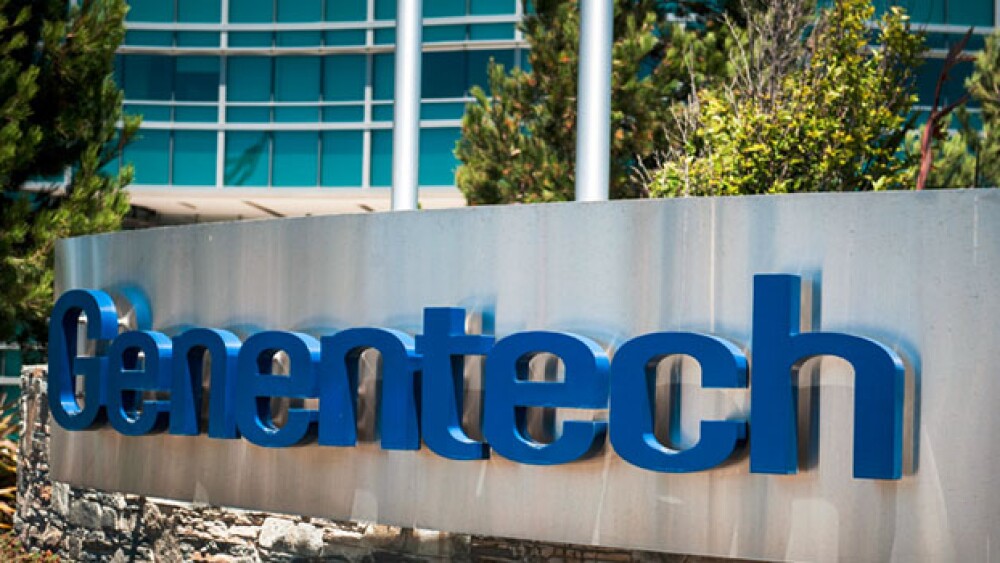Late Thursday, Genentech said the U.S. Food and Drug Administration granted regulatory approval for a combination of Tecentriq and Avastin for treatment of some metastatic non-squamous non-small cell lung cancer (NSCLC) patients.
Late Thursday, Genentech said the U.S. Food and Drug Administration (FDA) granted regulatory approval for a combination of Tecentriq and Avastin for treatment of some metastatic non-squamous non-small cell lung cancer (NSCLC) patients.
The FDA gave the greenlight to the two drugs in combination with chemotherapy for those NSCLC patients who have no EGFR or ALK genomic tumor aberrations. The approval was based on the Phase III IMpower150 study, which met its co-primary endpoints of overall survival (OS) and progression-free survival (PFS). In March the FDA granted the combination of Tecentriq and Avastin, a biologic antibody designed to specifically bind to a protein called vascular endothelial growth factor (VEGF), Priority Review as a first-line treatment of patients with metastatic non-squamous non-small cell lung cancer.
Tecentriq is one of five currently commercially available PD-1/L1 drugs, including Bristol-Myers Squibb’s Opdivo, Merck’s Keytruda, AstraZeneca’s Imfinzi and Pfizer/Merck KGaA’s Bavencio.
This regulatory approval marks the latest in a string of positive news regarding Tecentriq, an anti-PD-L1 immunotherapy. Over the past several months Genentech, a Roche subsidiary, has released a number of trial data that shows the efficacy of the drug in different cancers. In September, the company released Phase III data from the IMPower 133 trial that showed treatment with Tecentriq plus chemotherapy helped people with extensive-stage small cell lung cancer (ES-SCLC) live significantly longer than with chemotherapy alone. In May, the IMPower 130 study showed that a combination of Tecentriq and chemotherapy met its co-primary endpoints of overall survival and progression-free survival as a treatment for patients with advanced NSCLC. Also, the IMPower 131 study of Tecentriq and chemotherapy met its co-primary endpoint of progression-free survival in lung cancer.
For the latest FDA approval, Sandra Horning, Genentech’s chief medical officer and head of global product development, said the Tecentriq combination with Avastin demonstrated a “significant survival benefit in the initial treatment of metastatic non-squamous non-small cell lung cancer. Horning said the approval supports Genentech’s combination approach for Tecentriq in lung cancer, particularly for those who have complicated forms of the disease.
The Phase III IMPower 150 study showed the combination treatment helped these lung cancer patients live significantly longer compared to Avastin and chemotherapy in the intention-to-treat wild-type population. The combination treatment provided a median overall survival of 19.2 months. In addition, the combination reduced the risk of disease worsening or death (PFS) by 29 percent compared to Avastin and chemotherapy. The IMPower 150 study included 1,202 people. Of those, 1,045 were in the ITT-WT subpopulation, which excluded those people with EGFR and ALK mutations. The safety profile of the Tecentriq combination was consistent with that observed in previous studies, Genentech said.
Currently, Genentech has eight Phase III lung cancer studies underway evaluating Tecentriq alone or in combination with other medicines. Tecentriq is also approved by the FDA to treat people with metastatic NSCLC who have disease progression during or following platinum-containing chemotherapy, and have progressed on an appropriate FDA-approved targeted therapy if their tumor has EGFR or ALK genetic alterations.





